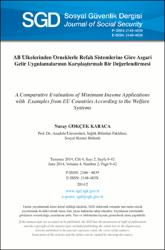| dc.contributor.author | Gökçek, Karaca Nuray | |
| dc.date.accessioned | 2019-10-22T20:06:56Z | |
| dc.date.available | 2019-10-22T20:06:56Z | |
| dc.date.issued | 2014 | |
| dc.identifier.issn | 2146-4839 | |
| dc.identifier.uri | http://www.trdizin.gov.tr/publication/paper/detail/TVRjd05qQXhNUT09 | |
| dc.identifier.uri | https://hdl.handle.net/11421/22129 | |
| dc.description.abstract | Günümüzde mevcut sosyal güvenlik sistemleri, işsizlik olgusu ve buna bağlı olarak artan yoksulluk ve sosyal dışlanma sorununu çözmede yetersiz kalmıştır. Bu durum mevcut sosyal güvenlik sistemlerinin ve refah devleti anlayışlarının yeniden yapılanmasını gündeme getirmiştir. Yeniden yapılanma arayışları, sosyal dışlanma ve uzun süreli işsizlik gibi kalıcı sosyal sorunlara uyarlanabilecek bir araç olarak asgari geliri yeniden önemli hale getirmiştir. Asgari gelir uygulamasına geçiş, hiç kuşkusuz sigorta merkezli mevcut sosyal güvenlik sis- temlerinde radikal değişiklikleri beraberinde getirecektir. Yaşanan dönüşümler bağlamında, refah modellerine göre bazı ülkeler bu değişiklikleri daha kolay gerçekleştirebilecek, bazıları ise değişiklikleri gerçekleştirmede zorlanacaktır. Söz konusu dönüşümlerin refah modellerine göre etkilerinin gözlenebilmesi, asgari gelir uygulamalarının refah sistemlerinin özel türlerine göre farklılık gösterip göstermediğinin belirlenebilmesi için yapılan bu çalışmada, refah modellerini temsil eden ülkeler bağlamında asgari gelir uygulamalarının karşılaş- tırmalı bir değerlendirilmesi yapılmıştır. | en_US |
| dc.description.abstract | Nowadays, the current social security systems have been insufficient to solve the problem of social exclusion and increasing poverty due to unemployment phenomenon. In this context, the restructuring of the current social security system and the understanding of the welfare state has been raised. The restructuring efforts have increased the importance of minimum income as a tool that can be adapted to persistent social problems, such as long-term unemployment and social exclusion. The transition to application of minimum income undoubtedly will bring radical changes in the current insurance-based social security system. In the contextthe transformation, according to welfare models some countries will perform these changes more easily; it will have difficulty in implementing changes in others. In this study, according to the welfare models, it was madecomparative evaluation of the minimum income application in order to determine differences in the application of minimum income and the effects of these transformations in the context of countries that representingwelfare models. | en_US |
| dc.language.iso | tur | en_US |
| dc.rights | info:eu-repo/semantics/openAccess | en_US |
| dc.subject | İktisat | en_US |
| dc.subject | İşletme | en_US |
| dc.title | AB Ülkelerinden örneklerle refah sistemlerine göre asgari gelir uygulamalarının karşılaştırmalı bir değerlendirmesi | en_US |
| dc.title.alternative | A Comparative evaluation of minimum ıncome applications with examples from EU countries according to the welfare systems | en_US |
| dc.type | other | en_US |
| dc.relation.journal | SOSYAL GÜVENLİK DERGİSİ | en_US |
| dc.contributor.department | Anadolu Üniversitesi, Sağlık Bilimleri Fakültesi, Sosyal Hizmet Bölümü | en_US |
| dc.identifier.volume | 4 | en_US |
| dc.identifier.issue | 2 | en_US |
| dc.identifier.startpage | 9 | en_US |
| dc.identifier.endpage | 42 | en_US |
| dc.relation.publicationcategory | Diğer | en_US] |


















